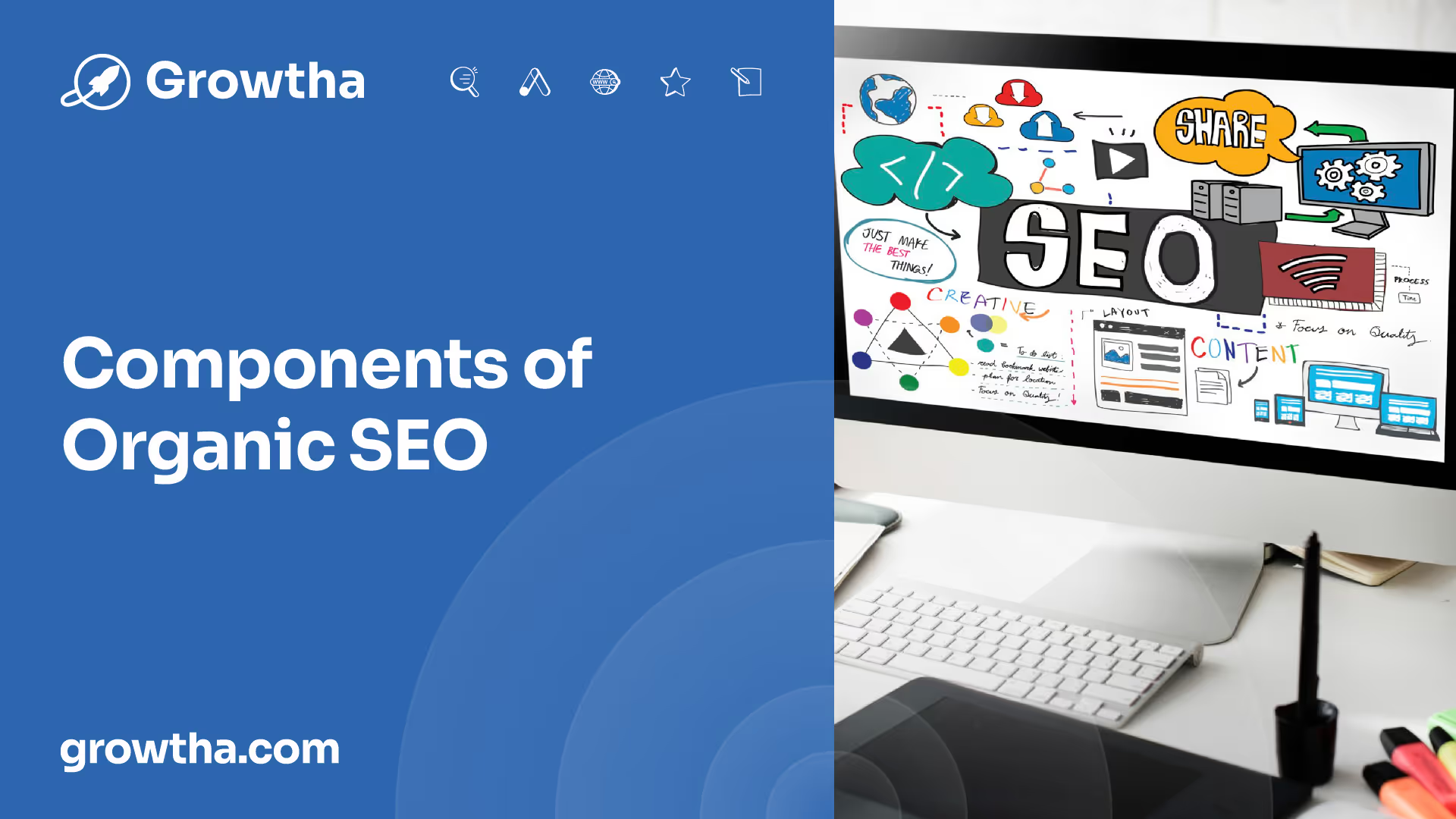What Is Organic SEO and How to Get Started
To effectively navigate the world of search engine optimization (SEO), it's crucial to have a solid understanding of organic SEO.


What Is Organic SEO and How to Get Started
Understanding Organic SEO
To effectively navigate the world of search engine optimization (SEO), it's crucial to have a solid understanding of organic SEO. This section will explore the concept of organic SEO, including its differentiation from paid search and the benefits it offers.
Differentiating Organic and Paid Search
Organic search focuses on unpaid rankings in search engine results pages (SERPs), while paid search revolves around paid rankings. In organic search, businesses optimize their website and content to improve visibility and appear higher in the search results without paying for placement. On the other hand, paid search allows advertisers to pay for a prominent position in the search results [1].
One of the key distinctions between organic and paid search lies in the cost. Organic search requires a time commitment and investment in SEO strategies, but it doesn't involve any upfront payment. In contrast, paid search necessitates an upfront ad spend to secure a prominent position in the search results [1].
Benefits of Organic Search
Organic search offers numerous benefits for businesses and website owners. Let's explore some of the advantages:
- Impressive Return on Investment (ROI): Organic SEO has been proven to yield a high return on investment. In fact, almost 90% of marketers consider SEO to be successful [1]. By investing time and effort into optimizing your website and content for organic search, you can drive valuable traffic and generate conversions without incurring significant costs.
- Enhanced Credibility: Appearing in the organic search results can boost your company's credibility. Users often perceive organic listings as more trustworthy and reliable compared to paid ads. A strong organic presence can leave a positive first impression on potential customers, increasing their likelihood of engaging with your brand [1].
- Targeted and Relevant Traffic: Organic search attracts users who are actively searching for information, products, or services related to your industry. By optimizing your website for relevant keywords and search queries, you can attract highly targeted traffic that is more likely to convert. Organic search allows you to target a wide range of searches without incurring upfront costs [1].
- Long-Term Visibility: While paid ads offer immediate visibility, organic search provides long-term visibility. Once you establish a strong organic presence and optimize your website effectively, you can maintain visibility in the search results for an extended period. This sustained presence can lead to consistent traffic and ongoing brand exposure.
By understanding the difference between organic and paid search, and recognizing the benefits that organic search offers, you can make informed decisions and strategize effectively to improve your website's visibility and drive organic traffic.

Getting Started with Organic SEO
When venturing into the world of organic search engine optimization (SEO), it's important to have a solid foundation and understanding of the key elements that contribute to a successful SEO strategy. This section will explore the importance of an SEO strategy, keyword research essentials, and optimizing content quality.
Importance of SEO Strategy
An SEO strategy is a comprehensive plan that outlines how to create, optimize, and promote content to improve its visibility in search engine results. It plays a crucial role in attracting more organic traffic to a website and ultimately increasing its online presence. By developing a well-defined strategy, businesses can align their efforts to achieve their SEO goals.
A solid SEO strategy involves various techniques, including keyword research, on-page optimization, technical SEO, and link building. It serves as a roadmap, guiding businesses in their quest to improve search engine rankings and drive relevant traffic to their websites.
Keyword Research Essentials
Keyword research is a fundamental step in any legitimate SEO strategy. It involves identifying the words and phrases that people use when searching for information related to your business or industry. By understanding these keywords, you can optimize your content to align with what your target customers are searching for.
Tools like Google Suggest, which provides keyword suggestions as you type in the search field, can be valuable for finding relevant keywords [2]. Long-tail keywords, which are longer and more specific search phrases, tend to be less competitive and easier to rank for. Incorporating these long-tail keywords into your content can help you attract more targeted traffic.
Analyzing the first-page results on search engines for your target keywords can provide insights into the types of content that resonate with your audience. For example, if the search engine results pages (SERPs) for a specific keyword are dominated by list posts, you may want to create a list post of your own to cover that topic. This approach can help you understand the content formats and structures that are popular among your target audience.
Optimizing Content Quality
Creating high-quality content is integral to a successful SEO strategy. By producing content that stands out from what is already ranking on the first page of search engine results, you increase the likelihood of attracting backlinks and improving your search engine rankings.
To optimize content quality, consider creating content that is different or superior to what is currently available. For example, instead of writing a standard list post, you could publish an in-depth ultimate guide on a particular topic. Providing unique value to your audience through comprehensive and well-researched content can help establish your website as a go-to resource in your industry.
In addition to uniqueness, focus on improving the readability and design of your content. Make it visually appealing, use subheadings and bullet points to enhance readability, and ensure proper grammar and spelling. Engaging and user-friendly content is more likely to be shared and linked to, which can positively impact your SEO efforts.
By understanding the importance of an SEO strategy, conducting thorough keyword research, and optimizing content quality, you can lay a strong foundation for your organic SEO initiatives. Remember to continually monitor and adjust your strategy as search engine algorithms evolve to ensure continued success in the ever-changing world of SEO.

Components of Organic SEO
To effectively implement organic SEO strategies, it's important to understand and utilize the key components that contribute to its success. These components include on-page SEO tactics, off-page SEO strategies, and technical SEO considerations.
On-Page SEO Tactics
On-page SEO tactics involve optimizing various elements on a webpage to improve its visibility in search engine results. This includes optimizing meta tags, using relevant keywords, creating high-quality content, and improving user experience. By utilizing these tactics, you can enhance your webpage's relevance and attractiveness to both users and search engines. Some key on-page SEO tactics include:
- Optimizing meta tags, such as title tags and meta descriptions, to accurately describe the content and attract users' attention.
- Conducting thorough keyword research to identify relevant and high-performing keywords to incorporate into your content.
- Creating well-structured and informative content that aligns with search intent and provides value to your target audience.
- Improving the user experience by optimizing page load speed, enhancing mobile-friendliness, and ensuring easy navigation throughout the website.
Off-Page SEO Strategies
Off-page SEO strategies focus on activities that occur outside of your own website to improve its authority and rankings in organic search results. Building high-quality backlinks from reputable websites is a key component of off-page SEO. By acquiring backlinks, you can demonstrate the credibility and relevance of your website to search engines. Some effective strategies for off-page SEO include:
- Building backlinks through techniques like guest blogging, influencer outreach, and social media promotion.
- Engaging with your audience and industry influencers to foster relationships and encourage them to link back to your content.
- Creating valuable and shareable content that naturally attracts backlinks from other websites.
- Leveraging social media platforms to promote your content and encourage others to link to it.
Technical SEO Considerations
Technical SEO considerations involve optimizing the technical aspects of your website to improve its performance and crawlability by search engines. This ensures that search engines can effectively discover, index, and rank your webpages. Key technical SEO considerations include:
- Optimizing site speed to provide a seamless and fast user experience, as well as meet search engine expectations for fast-loading websites.
- Ensuring mobile-friendliness to cater to the increasing number of users accessing the internet via mobile devices.
- Implementing structured data markup to provide additional context to search engines and enhance the visibility of your content in search results.
- Fixing broken links and ensuring proper website architecture to improve crawlability and user navigation.
By focusing on these components of organic SEO, you can effectively optimize your website and its content to improve visibility, attract organic traffic, and enhance your overall online presence. Remember to regularly monitor and adapt your strategies to stay up-to-date with search engine algorithms and industry trends.
Enhancing Content for SEO
To maximize the effectiveness of organic SEO, it's important to enhance the content on your website. This involves aligning with search intent, improving readability and design, and incorporating multimedia elements.
Aligning with Search Intent
Understanding and satisfying search intent is a crucial aspect of organic SEO. Google prioritizes providing users with the most relevant and helpful content based on their search queries. Different search queries have varying types of search intent, such as informational, transactional, navigational, or commercial investigation [3]. Analyzing the types of content that are already ranking on the first page of Google for a particular keyword can provide valuable insights. For example, if the top results are mostly list posts, it may be beneficial to publish a list post on your blog for that keyword [2].
Improving Readability and Design
One of the key aspects of enhancing content for SEO is improving its readability and design. Creating high-quality content that is well-written, accurate, and useful for the audience is essential for attracting and engaging readers. It's important to ensure that the content is easy to read, with clear headings, subheadings, and paragraphs. Using bullet points or numbered lists can also enhance readability and make the content more scannable.
In addition to readability, the design of the webpage plays a crucial role in user experience and SEO. A visually appealing design with a clean layout and easy navigation can keep visitors on your website longer and encourage them to explore further. This can contribute to lower bounce rates and higher engagement metrics, which can positively impact your organic search rankings.
Incorporating Multimedia Elements
Incorporating multimedia elements into your content can enhance its value and appeal to both users and search engines. Multimedia elements such as images, charts, infographics, videos, and audio files can make your content more engaging and visually appealing. They can also provide additional information and context to support the written content.
When including multimedia elements, it's important to optimize them for SEO. This involves using descriptive file names and alt tags for images, providing transcripts for videos and audio files, and ensuring that the media files are properly compressed for fast loading times. Optimizing multimedia elements not only improves the user experience but also helps search engines understand the content and context of your webpage.
By enhancing your content to align with search intent, improving readability and design, and incorporating multimedia elements, you can increase the relevance, value, and appeal of your website's content. These optimizations contribute to better user experience, increased engagement, and improved organic search rankings.
Building Backlinks for Organic SEO
In the world of organic SEO, building backlinks plays a crucial role in improving a website's search engine rankings. Backlinks act as votes of confidence in the eyes of search engines, indicating that other reputable websites consider your content valuable and trustworthy [4]. Let's explore the importance of backlinks, strategies for building them, and the concept of leveraging linkable assets.
Importance of Backlinks
Backlinks are an essential factor in organic SEO as they help search engines determine the credibility and authority of a website. Search engines consider backlinks as a signal of the quality and relevance of the content on your site. The more high-quality backlinks a website has, the higher it is likely to rank in search results.
Not all backlinks are created equal. Search engines value backlinks from reputable and authoritative websites more than those from low-quality or spammy sources. It's important to focus on acquiring backlinks from relevant, trustworthy websites to enhance your website's organic search visibility.
Strategies for Backlink Building
To build backlinks effectively, it's crucial to implement various strategies that can attract links from other websites. Some popular strategies for backlink building include:
- Broken link building: Identify broken links on relevant websites and reach out to the website owners, offering your content as a replacement for the broken link. This strategy provides value to the website owner and increases the chances of getting a backlink.
- Unlinked brand mentions: Monitor online mentions of your brand or content that do not include a link. Reach out to the website owners and kindly request them to add a link to your website or content, turning unlinked mentions into valuable backlinks.
- Guest blogging: Contribute guest posts to authoritative websites in your industry. By providing high-quality content, you can earn backlinks in the author bio or within the body of the article, establishing your expertise and expanding your reach.
- Influencer outreach: Collaborate with influencers or industry experts who have a significant online following. By creating valuable content together, you can attract backlinks from their websites and social media profiles, boosting your website's visibility.
Leveraging Linkable Assets
Creating linkable assets is a powerful strategy for building backlinks. Linkable assets refer to high-quality content pieces or resources that naturally attract links from other websites. By developing content that stands out and provides value to users, you increase the likelihood of other websites linking to it [4].
Linkable assets can take various forms, such as comprehensive guides, data-driven research, infographics, or interactive tools. The key is to focus on creating content that is unique, well-researched, and relevant to your target audience. When other websites find your linkable assets valuable, they are more likely to link to them, enhancing your website's backlink profile and boosting organic search visibility.
Remember, building backlinks is an ongoing process that requires patience and consistent effort. By implementing effective strategies and creating linkable assets, you can strengthen your website's authority, improve organic search rankings, and drive more organic traffic to your site.
Monitoring and Tracking Performance
To ensure the effectiveness of your organic SEO efforts, it's crucial to monitor and track the performance of your website. This allows you to assess the impact of your strategies, make data-driven decisions, and identify areas for improvement. In this section, we will explore some essential aspects of monitoring and tracking performance in the realm of organic SEO.
Utilizing SEO Tools
Utilizing SEO tools is instrumental in gaining insights into your website's organic search performance. These tools provide valuable data and metrics that enable you to evaluate your SEO strategies and make informed decisions. Some popular SEO tools include Google Search Console, Google Analytics, SE Ranking, and SEMrush.
Google Search Console allows you to monitor your website's presence in Google search results, track keyword rankings, analyze click-through rates, and identify any technical issues that may affect your organic visibility. Google Analytics provides comprehensive data on website traffic, user behavior, and conversion rates, helping you understand the effectiveness of your SEO efforts.
SE Ranking and SEMrush offer a wide range of features, including keyword research, competitor analysis, and rank tracking. These tools allow you to gain insights into your organic competitors, identify keyword opportunities, and track your keyword rankings over time. By utilizing these tools, you can gather valuable data to inform your SEO strategy and measure your website's performance.
Analyzing Keyword Rankings
Analyzing keyword rankings is a crucial aspect of monitoring your organic SEO performance. By tracking your keyword rankings, you can assess the effectiveness of your optimization efforts and identify trends and patterns among the top-ranking content. Tools like SEMrush and SE Ranking provide comprehensive keyword tracking features that allow you to monitor your positions in search engine results pages (SERPs).
When analyzing keyword rankings, it's important to consider the intent behind the search queries. Understanding the search intent can help you align your content with what users are looking for and improve your chances of ranking higher. For instance, if the SERPs for a specific keyword are dominated by list posts, you may want to create a list post on your own blog to cover that topic [2].
Assessing SEO Progress
Assessing your SEO progress involves evaluating various metrics and performance indicators to determine the effectiveness of your optimization efforts. Key metrics to consider include organic traffic, organic conversion rates, and bounce rates. These metrics provide insights into the quality and relevance of the organic traffic coming to your website.
In addition to quantitative metrics, it's important to consider qualitative factors such as user engagement, brand visibility, and the acquisition of high-quality backlinks. These aspects contribute to your overall SEO progress and can impact your website's organic search rankings.
Regularly reviewing and analyzing these metrics allows you to identify areas of improvement and adapt your SEO strategies accordingly. By keeping a close eye on your SEO progress, you can make data-driven decisions to optimize your website for better organic search performance.
Monitoring and tracking performance are integral components of a successful organic SEO strategy. By utilizing SEO tools, analyzing keyword rankings, and assessing SEO progress, you can measure the effectiveness of your efforts and make informed decisions to enhance your website's visibility and organic search rankings.
References
[1]: https://www.webfx.com/seo/learn/organic-search-vs-paid-search/
[2]: https://backlinko.com/seo-strategy
[3]: https://www.semrush.com/blog/seo-best-practices/
[4]: https://www.semrush.com/blog/organic-seo/
[5]: https://www.techtarget.com/whatis/definition/organic-search-results







